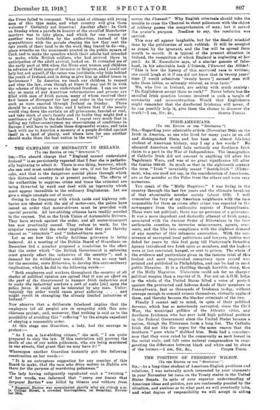TIM CAMPAIGN OF MENDACITY IN IRELAND. [To THE EDITOR OF
THE " SPECTATOR."] SIX,—The absurd charge that " England cannot understand Ireland" is.so persistently repeated that I fear she is pathetically beginning to admit it. There is one thing, however, which she can and must understand for her own, if not for Ireland's sake, and that is the dangerous mental phase through whioh this distracted country is at present passing. The efforts of the authorities to suppress crime and trace 'the criminal are being thwarted by word and deed with an ingenuity which must appear incredible to the ordinary Englishman. Let me give a single example out of many.
Owing to the frequency with which raids and highway robberies are effeoted with the aid of motor-cars, the police have issued an order that motor-drivers must be provided with special permits. All law-abiding citizens have readily acceded to the request. Not so the Irish Union of Automobile Drivers. They have struck against the order, and all motor transport has now practically ceased. They refuse to work, for the singular reason that the order implies that they are thereby classed as " criminals " and " ticket-of-leave men."
Let us see how this wholly fictitious grievance is being fostered. At a meeting of the Dublin Board of Guardians on December 3rd a member proposed a resolution to the effect that the order which " the British Government is enforcing must gravely affect the industries of the country "; and a demand for its withdrawal was added. It was an easy task for the seconder, more Hibernico, to develop this extraordinary implication, which he did in the following words: " Both employers and workers throughout the country of all shades of political opinion are agreed that it was an effort on the part of the Government to hamper Irish industries and to make the industrial workers a sort of scabs [sic] upon the police force. It could not be tolerated by any man. Unfortunately the order would cause great suffering . . . and might result in strangling the already limited industries of Ireland."
Now observe that a deliberate falsehood implies that the employers (of all people) are in sympathy with this mischievous protest; and, moreover, that nothing is said as to the possibility of avoiding this " suffering" by the simple expedient of obeying a reasonable order.
At this stage one Guardian, a lady, had the courage to protest:— "As I am a law-abiding citizen," she said, " I am quite prepared to obey the law. If this restriction will prevent the death of one of our noble policemen, who are being murdered In our streets, God grant that we may have it! "
Whereupon another Guardian !instantly put the following construction on her words :—
" It is an outrageous suggestion for any member of this Board to make, that the men who drive motors in Dublin are there for the purpose of murdering policemen."
The lady having indignantly repudiated suph a " twisting " of her words, was informed that " every one knows that Sergeant Barton* was killed by thieves and robbers from across the Channel." Why English criminals should take the trouble to cross the Channel to shoot policemen with the object of robbery passes the comprehension of man; but it served the orator's purpose. Needless to say, the resolution was carried.
This may all appear laughable, but for the deadly mischief done by the publication of such rubbish. It will be accepted as gospel by the ignorant, and the lies will be spread from mouth to mouth. It is typical of the present situation in Ireland, the recognition of which England is neglecting e,t her peril. As M. Esooufiaire says, of a. similar genesis of falsehood, in his admirable book L'Irlanda, l'Ennemi des Allies I: "This is how the history of this martyred race is written; one could laugh at it if one did not know that in twenty years' time [I would substitute `twenty hours'] earnest man will take these fables, so solemnly uttered, as true facts."
We, who live in Ireland, are asking with much anxiety : " Do Englishmen accept them as such? " Never before has the so-called Irish question become involved in such a tangle of mendacity and misconstruction. Would that Englishmen might remember that the disaffected Irishman will never, if he can possibly help it, give them the chance to discover the truth !—I am, Sir, &c., SEMPER FIDELIS.


















































 Previous page
Previous page